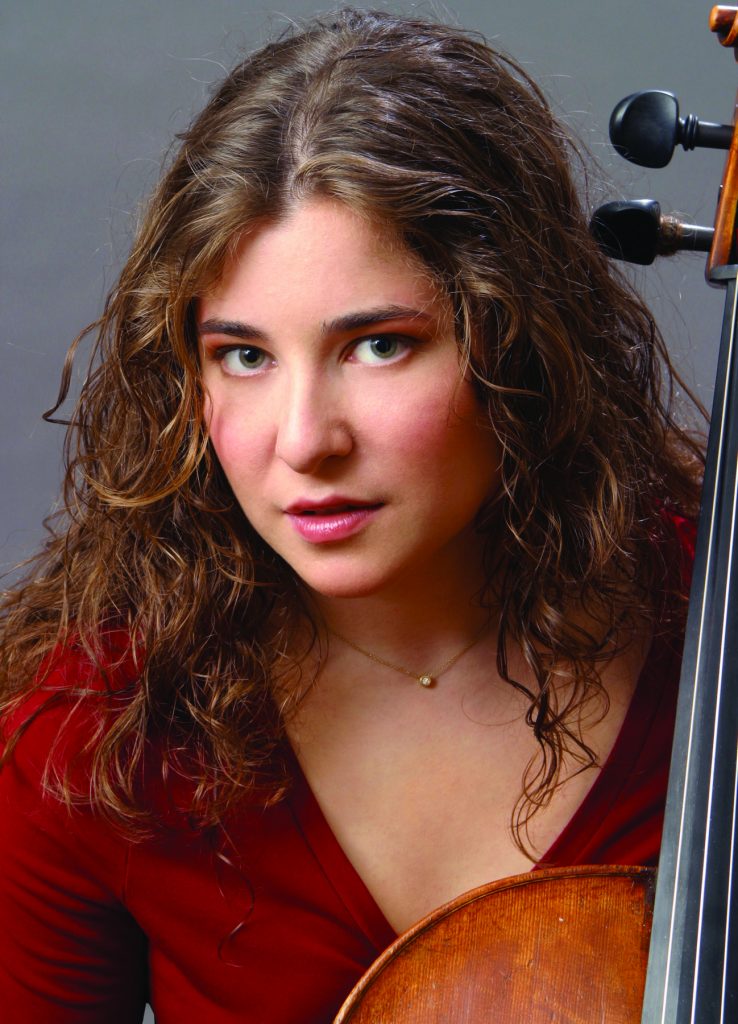Weilerstein Gives Stunning Account of Kodály Sonata for Solo Cello at SummerFest 2020
Alisa Weilerstein had played barely three minutes of Zoltán Kódaly’s rapturous Sonata for Solo Cello, Op. 8, when I was seized with the overpowering realization: this is why love SummerFest! When an accomplished musician or an electric ensemble revives an unjustly overlooked piece of repertory—or unveils a dashing premiere—the elation of discovery is a unique satisfaction. And it lifts my spirit unlike and other musical feat, no matter how virtuosic.

Alisa Weilerstein [photo (c.) Christian Steiner]
The Sonata, written in 1915, opens with a bold cadenza that soon lifts into unexpected lyrical flights and entrancing modal themes that unexpectedly morph into impassioned bravura assertions, exploiting the entire range of the cello. Like most middle movements, Kodály’s Adagio provides a slow, centered contrast to the energetic outer movements. Somber, almost elegiac themes rumble from the lowest cello range—a bit of scordatura gives the instrument a lower than usual bass range—and Weilerstein found a wide spectrum of colors, deft harmonics, and varied pizzicato attacks to construct this kaleidoscopic otherworldly ethos. If the closing movement, a bold Allegro molto vivace, brings back the exuberance of the first movement, the composer offers an astute selection of contrasting techniques to create the mood: a sharply defined moto perpetuo opening, folk-derived tremolandos, and an abundance of earthy dance rhythms.
Unlike his close friend Béla Bartók, Kodály was a more pragmatic composer, so classical music aficionados remember him for his later, more ingratiating orchestral works such as the Dances of Galánta that cautious music directors like to program. But the Kodály dear to my heart is the audacious composer of chamber music such as his 1914 Duo for Violin and Cello and this nonpareil Sonata for Solo Cello.
SummerFest 2020 Music Director Inon Barnatan wisely followed the Kodály with Joseph Suk’s Piano Quartet in A Minor, another rich but rarely programmed gem. Written in 1891 by the unusually precocious 17-year-old Suk, his Piano Quartet brims with fresh ideas deftly structured over three movements, instead of the usual four. Suk’s gift for shaping a graceful melodic line—after all he was a pupil on Antonín Dvořák—suffuses this exhilarating chamber work.
Barnatan appropriately grounded the quartet with authoritative work at the piano, especially in the urgent, animated middle section of the Adagio and in the final movement, Allegro con fuoco, where the piano introduces the bracing rondo theme. Cellist Clive Greensmith offered the right touch of nostalgia as he crafted the dulcet theme that opens the Adagio, and violinist Tessa Lark and violist Yura Lee energized the work’s upper voices with fluid, shapely contours. If SummerFest has offered this Suk Piano Quartet in previous seasons, I must have missed those performances, but hearing this performance came as a most welcome surprise to this jaded critic.
Yura Lee proved her prowess as violinist opening the program with Mozart’s Violin Sonata in E Minor, K. 304. Accompanied by pianist Barnatan, she offered the composer’s assertive, angular themes with decisive articulation and brisk rhythmic clarity. Perhaps because she is such a fine violist, she imbued the violin’s lower range with an unusually opulent timbre that became silvery only when she ascended into the instrument’s upper ranges. Although this sonata is short—a mere pair of movements—Lee and Barnatan gave a probing, multi-hued account of this bracing work from Mozart at age 22.
The final online program of SummerFest 2020 can be heard this evening, August 29, at 7:00 p.m. See ljms.org for online access.

Ken Herman, a classically trained pianist and organist, has covered music for the San Diego Union, the Los Angeles Times’ San Diego Edition, and for sandiego.com. He has won numerous awards, including first place for Live Performance and Opera Reviews in the 2017, the 2018, and the 2019 Excellence in Journalism Awards competition held by the San Diego Press Club. A Chicago native, he came to San Diego to pursue a graduate degree and stayed.Read more…

Best to date.